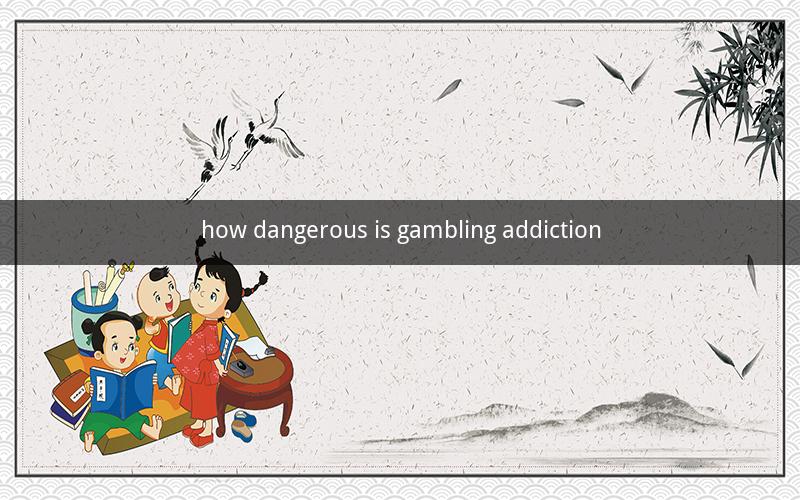
Table of Contents
1. Understanding Gambling Addiction
2. The Risks of Gambling Addiction
3. The Psychological Impact
4. The Financial Consequences
5. Social and Family Effects
6. Identifying the Signs of Gambling Addiction
7. Treatment and Recovery
8. Prevention and Support
9. Conclusion
1. Understanding Gambling Addiction
Gambling addiction, also known as compulsive gambling, is a condition characterized by an inability to control the urge to gamble, despite the negative consequences it may cause. It is considered a type of addictive behavior, often categorized alongside substance abuse disorders.
2. The Risks of Gambling Addiction
Gambling addiction poses various risks, which can affect individuals, families, and society as a whole. Some of the key risks include:
a. Financial Ruin: Compulsive gamblers may lose substantial amounts of money, leading to financial instability, debt, and even bankruptcy.
b. Psychological Disorders: Individuals with gambling addiction may experience mental health issues such as depression, anxiety, and mood swings.
c. Legal and Criminal Consequences: Some gamblers may engage in illegal activities to support their addiction, leading to legal problems and imprisonment.
d. Social and Family Struggles: Gambling addiction can strain relationships, leading to isolation, divorce, and other family issues.
3. The Psychological Impact
The psychological impact of gambling addiction can be severe. Individuals with this condition often exhibit the following symptoms:
a. Preoccupation with gambling: Constant thoughts about gambling, planning for future gambling sessions, and reliving past gambling experiences.
b. Loss of control: Difficulty in stopping or reducing gambling behavior, despite attempts to do so.
c. Emotional and behavioral changes: Increased irritability, mood swings, and aggressive behavior.
d. Lying and deceit: Hiding gambling activities from loved ones, leading to trust issues.
4. The Financial Consequences
Financial consequences are among the most significant risks associated with gambling addiction. Some of the financial impacts include:
a. High debt levels: Gamblers may accumulate substantial debt, often resorting to credit cards, loans, or borrowing from friends and family.
b. Loss of income: Individuals with gambling addiction may neglect their job responsibilities, leading to a decrease in income or job loss.
c. Financial fraud: Some gamblers may resort to stealing or committing fraud to fund their addiction.
5. Social and Family Effects
Gambling addiction can have severe social and family consequences, including:
a. Relationship strain: Infidelity, emotional abuse, and neglect can lead to broken relationships and family breakdown.
b. Isolation: Compulsive gamblers may withdraw from social activities, leading to loneliness and increased risk of depression.
c. Legal problems: The addiction may lead to legal issues, which can further strain family dynamics.
6. Identifying the Signs of Gambling Addiction
Recognizing the signs of gambling addiction is crucial for early intervention and treatment. Some common signs include:
a. Secretive behavior: Hiding gambling activities from loved ones.
b. Borrowing money: Constantly borrowing money to fund gambling habits.
c. Neglecting responsibilities: Failing to fulfill work, school, or family obligations.
d. Denial: Refusing to acknowledge the negative consequences of gambling.
7. Treatment and Recovery
Treatment for gambling addiction involves various approaches, including therapy, counseling, and support groups. Some of the treatment options include:
a. Cognitive-behavioral therapy (CBT): Helps individuals recognize and change negative thoughts and behaviors related to gambling.
b. Family therapy: Assists families in addressing the impact of gambling addiction and rebuilding trust.
c. Support groups: Provides a platform for individuals to share experiences and receive encouragement from others who have faced similar challenges.
8. Prevention and Support
Preventing gambling addiction involves creating a supportive environment and promoting awareness. Some strategies for prevention and support include:
a. Education: Raising awareness about the risks of gambling addiction and the importance of responsible gambling.
b. Responsible gambling initiatives: Implementing policies that encourage responsible gambling practices and provide resources for those struggling with addiction.
c. Support networks: Establishing support groups and resources for individuals and families affected by gambling addiction.
9. Conclusion
Gambling addiction is a serious condition with severe consequences. Recognizing the signs, seeking treatment, and implementing prevention strategies are essential in addressing this issue. By promoting awareness and support, we can help individuals and families affected by gambling addiction find a path to recovery.
10 Questions and Answers:
1. Q: Can someone be addicted to gambling without losing money?
A: Yes, addiction to gambling is not solely based on financial loss. It is characterized by the inability to control the urge to gamble, regardless of the consequences.
2. Q: Does gambling addiction only affect adults?
A: No, gambling addiction can affect individuals of all ages, including teenagers and young adults.
3. Q: Can gambling addiction be treated?
A: Yes, gambling addiction can be treated through various approaches, including therapy, counseling, and support groups.
4. Q: How can I tell if someone is struggling with gambling addiction?
A: Look for signs such as secretive behavior, borrowing money, neglecting responsibilities, and denial.
5. Q: Are there any legal consequences for gambling addiction?
A: Legal consequences may arise if individuals with gambling addiction engage in illegal activities to support their addiction.
6. Q: Can gambling addiction lead to depression?
A: Yes, gambling addiction can contribute to depression, as individuals may experience feelings of guilt, shame, and despair due to their behavior.
7. Q: Can gambling addiction be hereditary?
A: There is some evidence to suggest that genetic factors may play a role in the development of gambling addiction, but it is not solely hereditary.
8. Q: Are there any support groups for individuals with gambling addiction?
A: Yes, there are various support groups and organizations that provide assistance and resources for individuals and families affected by gambling addiction.
9. Q: Can gambling addiction be prevented?
A: Yes, prevention involves education, responsible gambling initiatives, and creating a supportive environment.
10. Q: How long does treatment for gambling addiction typically last?
A: The duration of treatment for gambling addiction can vary depending on the individual's needs. Some may require short-term therapy, while others may benefit from long-term support and counseling.